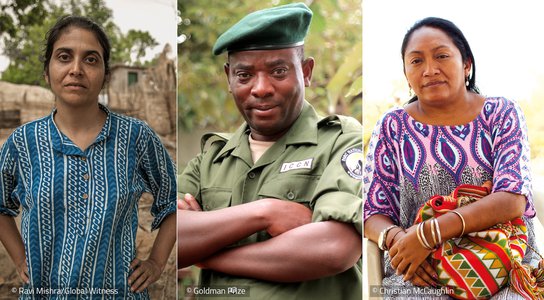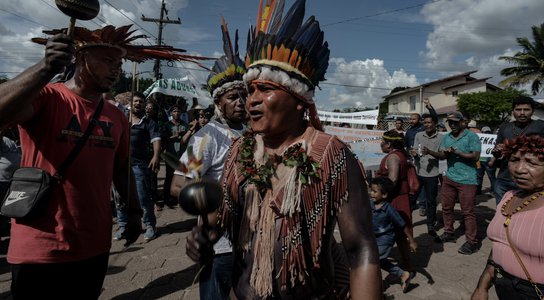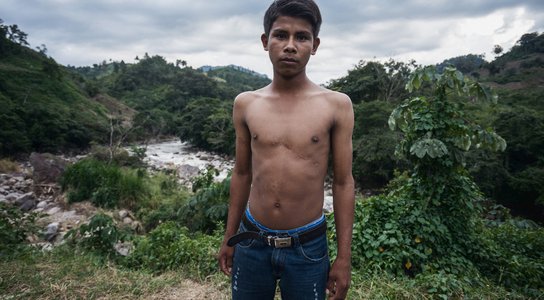Killings of those protesting land grabs in
one-third more countries than 2015
Nearly four people were murdered every week in 2016 whilst protecting their land, forests and rivers from mining, logging and agricultural companies, a new report from Global Witness reveals today.
At least 200 people were killed in 2016, more than twice the number of journalists (79). The trend is both growing (up from 185 in 2015) and spreading, with murders reported in 24 countries compared to 16 in 2015. The report documents a threefold increase in India, for example, as police brutality and state suppression of activist worsens. Latin America remains the worst affected region, home to 60% of murders.
Severe limits on available information mean the global total is likely far higher. Murder is the sharp end of a range of tactics used to silence defenders, including death threats, arrests, sexual assault, abductions and aggressive legal attacks.
“They threaten you so you will shut up. I can’t shut up. I can’t stay silent faced with all that is happening to my people. We are fighting for our lands, for our water, for our lives,” Jakeline Romero told Global Witness.
Jakeline is a Colombian indigenous leader who has faced years of threats and intimidation for speaking out against the devastating impacts of El Cerrejón, Latin America’s largest open-pit mine. Owned by London-listed companies Glencore, BHP Billiton and Anglo-American, the project has been blamed for water shortages and mass displacement.[i] The local operator has denied causing water shortages and condemned threats suffered by activists.
“These reports tell a very grim story. The battle to protect the planet is rapidly intensifying and the cost can be counted in human lives. More people in more countries are being left with no option but to take a stand against the theft of their land or the trashing of their environment. Too often they are brutally silenced by political and business elites, while the investors that bankroll them do nothing,” said Global Witness campaigner Ben Leather.
Almost 40% of those murdered were indigenous, as land they’ve inhabited for generations is stolen by companies, landowners or state actors. Projects are typically imposed on communities without their free, prior and informed consent, backed up by force: police and soldiers are suspected perpetrators in at least 43 murders. Protest is often the only option left to communities exercising their right to have a say about the use of their land and natural resources, putting them on a collision course with those seeking profit at any cost.
Key findings from the report include:
- Mining is the bloodiest trade, with at least 33 murders linked to the sector. Killing linked to logging companies increased from 15 to 23 in one year, while there were 23 killings connected to agribusiness projects.
- Brazil remained the deadliest country in terms of sheer numbers (49 murders); with Nicaragua (11) the worst place per capita last year. Honduras retains its status as the most dangerous place per capita over the past decade (127 since 2007)
- Recorded killings reached an all-time high in Colombia (37), as areas previously under guerrilla control are eyed by extractive companies and paramilitaries. Returning communities are attacked for reclaiming land stolen during the country’s long conflict
- India has seen a threefold increase in killings as police brutality and repression of peaceful protests worsens. 2016 saw 16 murders, mostly linked to mining projects.
- Protecting national parks is riskier than ever, with large numbers of rangers killed in Africa. There were 9 proven murders of rangers in the Democratic Republic of Congo in 2016.
- A voracious mining industry makes the Philippines stand out for killings in Asia, with 28 recorded killings.
The report also notes the increasing criminalisation of these activists right across the world, including in the US. They are often painted as criminals, facing trumped-up criminal charges and aggressive civil cases brought by governments and companies seeking to silence them.
“States are breaking their own laws and failing their citizens in the worst possible way. Brave activists are being murdered, attacked and criminalised by the very people who are supposed to protect them. Governments, companies and investors have a duty to guarantee that communities are consulted about the projects that affect them, that activists are protected from violence, and that perpetrators are brought to justice,” said Ben Leather.
For interviews and briefings in English, Spanish and French, and other information please contact:
Ben Leather +44 (0)7841 337 034 [email protected]
Billy Kyte +44 (0)7703 671 308 [email protected]
High-quality imagery and video testimony from India, Colombia and Nicaragua can be found at: http://bit.ly/2sEQ1aN
[i] See Aljazeera (10 February 2016), ‘Life by Latin America's largest open-pit coal mine’. Available at: http://www.aljazeera.com/indepth/features/2016/02/life-latin-america-largest-open-pit-coal-160201114829811.html; El Heraldo (24 July 2014), ‘Indígenas denuncian que hay 18.200 afectados por sequía en La Guajira’. Available at: https://www.elheraldo.co/la-guajira/indigenas-denuncian-que-hay-18200-afectados-por-sequia-en-la-guajira-160446 and joint written statement CETIM and AAJ (11 November 2007) ‘Human rights violations committed by transnational corporations in Colombia’. Available at: http://www.cetim.ch/human-rights-violations-committed-by-transnational-corporations-in-colombia/
/ ENDS
Contacts
You might also like
-
Report Defenders of the earth
2016 saw a record 200 killings of people defending their land, forests and rivers against destructive industries
-
Campaign Land and environmental defenders
Land and environmental defenders play a crucial role in protecting their land - and our climate - against destructive business practices.
-
Report Honduras: the deadliest country in the world for environmental activism
More than 120 people have been killed in Honduras since 2010 for standing up to companies that grab land and trash the environment